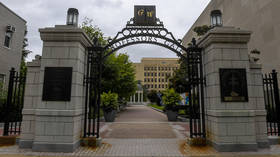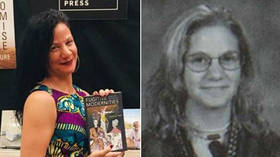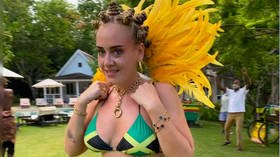Two more people have admitted they pretended to be black. But if ‘race is a social construct’, who are we to say they’re not?

Another two individuals who had been living their lives as black people were recently outed as non-black. But if — as we’re often told — ‘race is social construct’, what makes it possible to say that they’re non-black?
On 3 September, Jessica Krug — a historian who has since resigned from George Washington University — published a blog post titled, ‘The Truth, and the Anti-Black Violence of My Lies’. In the post she revealed that, despite having presented herself as a black woman (and having described herself as an “unreformed child of the hood”), she was in fact a white, Jewish woman. Of course, she didn’t put it in such simple terms. Instead, she wrote, “I have eschewed my lived experience as a white Jewish child in suburban Kansas City under various assumed identities within a Blackness that I had no right to claim”.
Krug also described what she had done as “the very epitome of violence, of thievery and appropriation, of the myriad ways in which non-Black people continue to use and abuse Black identities and cultures”.
It later transpired that her confession was motivated not by a sudden change of heart, but rather by the realisation that others, including “one very brave very BLACK Latina junior scholar”, had become aware of her duplicity. Pictures have since emerged in which Krug looks distinctly non-black.
On 7 September, CV Vitolo-Haddad — a graduate student at the University of Wisconsin-Madison who uses the pronouns ‘they/them’ — published a similar blog post titled ‘A First Step’, in which ‘they’ apologised for letting “guesses about my ancestry become answers.” In a follow-up post titled ‘A Second Step’, they clarified that “I am Southern Italian/Sicilian.” They also noted, “When asked if I identify as Black, my answer should have always been “No.” There were three separate instances I said otherwise.” (It can be tricky to always give the same answer when asked about your race.)
As in the Krug case, Vitolo-Haddad’s public declaration was prompted by another individual calling into question ‘their’ claimed non-white background. In particular, their two blog posts were written in response to an anonymous blog post titled ‘CV Vitolo “Haddad”: Another Academic Racial Fraud?’, which documented various inconsistencies in their public statements, included several photos of them looking distinctly non-black, and disclosed that all four of their grand-parents were white Italians.
Of course, Krug and Vitolo-Haddad are not the first white people to have been outed as non-black. Back in 2015, Rachel Dolezal — who was then president of an NAACP chapter — was revealed to have lied about being black after a journalist contacted her parents (from whom she is estranged), and obtained a copy of her birth certificate, as well as photos of her with blonde hair, fair skin and freckles. In an interview, her father stated, “She’s clearly our birth daughter, and we’re clearly Caucasian — that’s just a fact.”
But if — as we’re constantly reminded — ‘race is a social construct’, what makes it possible to say that Krug, Vitolo-Haddad and Dolezal are not black?
The obvious answer is that race is not a social construct, and what makes it possible to say they are not black is that they don’t have Sub-Saharan ancestry. (An alternative formulation of this answer would be: even if races are in some sense ‘socially constructed’, that doesn’t mean they can’t differ from one another genetically.)
But in the current year, obvious answers aren’t necessarily ‘correct’. As Douglas Murray says, “we’re in this strange position of pretending we know about things we don’t know about, and pretending to not know about things we all knew until yesterday.”
So how does a ‘social constructionist’ approach the question of why the three aforementioned individuals are not black? A common argument, it seems, is that non-black individuals who claim to be black do not actually experience ‘blackness’ because they can revert to being non-black any time they want. As one commentator wrote in 2015, “The ability to accept marginalization, to take on the identity of blackness without living the burdens of it and always knowing you could, on a whim, escape it, is not a transition to blackness”.
In other words, black people are treated differently to non-black people, especially in countries like the United States, and even if a non-black person temporarily presents herself as black, she will never truly experience being black because she can always choose to stop presenting herself as black, and go back to being treated as non-black.
What are we to make of this argument? One problem is that it doesn’t square with most people’s intuitive understanding of race. For example, it seems to imply that if an individual who did not have Sub-Saharan ancestry but looked like she might have Sub-Saharan ancestry were raised to believe she did have Sub-Saharan ancestry, then that individual would be black. For example, if Jessica Krug’s parents had told her that they’d adopted her, and that she was black, then Krug would be a black woman after all.
In addition, it seems to imply that if the hypothetical adopted Jessica Krug, whose parents had told her she was black, took an ancestry test at age 20, she might cease to be black. The test would (presumably) show that she did not have Sub-Saharan ancestry, and Krug could then choose to start presenting herself as non-black. One might have to say that she was black from age 0 to 20, and non-black from age 20 onwards.
A more fundamental problem with the ‘social constructionist’ argument is that it presupposes there are people who can be identified as black insofar as they possess certain observable features (e.g., dark skin, curly hair, etc.), i.e., it presupposes that race has some kind of biological basis. As I’m sure you will agree, no argument that presupposes something it purports to deny can be off to a good start.
Rather than simply saying that someone is black if she has the genetic ancestry that gives rise to black features, the ‘social constructionist’ insists that someone is black if she is subject to the consequences of possessing those features, i.e., being treated a particular way in society. By this logic, almost anything could be described as a ‘social construct’. For example, one could say that something belongs to the socially constructed category ‘car’ if it is subject to the consequences of possessing car-like features (e.g., being driven on one side of the road, being towed away when it is parked illegally, etc.).
Interestingly, while both Krug and Vitolo-Haddad have admitted to being non-black, Dolezal — as of 2017 — still “identifies as black”. She maintains that “race is a social construct”, which can be “reconstructed or deconstructed”, and that ‘black’ is “a culture, a philosophy, a political and social view”. Overall, Dolezal may not have convinced me that she is black, but she has convinced me that she is more intellectually consistent than her critics.
The statements, views and opinions expressed in this column are solely those of the author and do not necessarily represent those of RT.















